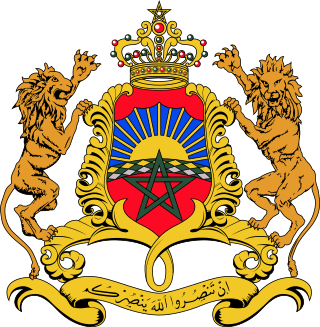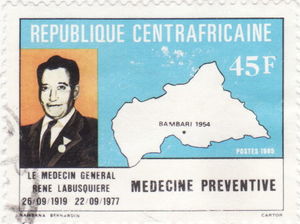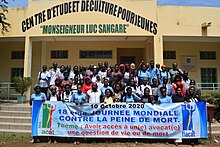Cities for Life Day is a worldwide festivity that supports the abolition of the death penalty. It is celebrated on November 30 of each year—the day in 1786 that the Grand Duchy of Tuscany, under the reign of Pietro Leopoldo, became the first civil state in the world to do away with torture and capital punishment.
The MIVILUDES is a French government agency created by presidential decree in 2002. It is charged with observing and analyzing the phenomenon of cult movements, coordinating the government response, informing the public about the risks arising from sectarian aberrations, and facilitating the implementation of actions to aid the victims.
On 10 November 1998, the United Nations General Assembly proclaimed the first decade of the 21st century and the third millennium, the years 2001 to 2010, as the International Decade for the Promotion of a Culture of Peace and Non-Violence for the Children of the World.

Morocco became a highly repressive country under the absolute monarchy of King Hassan II, and continues to be considered repressive under the reign of King Mohammed VI, though the latter has instituted some reforms. Dozens of journalists, artists, and ordinary citizens are regularly sentenced to lengthy prison sentences for exercising basic rights enjoyed elsewhere in the world, such as freedom of the press, protesting the government, or criticizing government officials. Morocco heavily restricts basic human rights, such as freedom of speech, the right to assembly, and the right to criticize officials. Moroccans also feel the pressures of inflation within the country, such as the lack of basic services like healthcare, clean water, and the difficulty of parents to access quality education for their children. While there have been a handful of reforms that have been generally welcomed internationally, most Moroccans feel this is insufficient, and continue to be unhappy with the trajectory of the country under the policies of King Mohammed VI, despite his transition of the government to an ostensible constitutional monarchy. Under his father, King Hassan II, Morocco had one of the worst human rights records in Africa and the world, especially during the time period known as the "Years Of Lead", which lasted from the early 1960s until the late 1980s; it was a period in the country's history that was known for the brutal repression of political dissent and opposition, that involved wide-scale arrests, arbitrary detention, lengthy imprisonment, and even killings of political opponents. Currently, Morocco continues to face some of these issues, as well as other human rights problems, such as poor prison conditions, the mistreatment of women and the LGBT community, and the widespread use of torture by police. Despite the considerable improvements made in the last several years under the leadership of King Mohammed VI, who has rolled back some of his father's harshest decrees, repression of political dissidence, and torture of citizens by officials, is still commonplace in Morocco today.

The Republic of Congo gained independence from French Equatorial Africa in 1960. It was a one-party Marxist–Leninist state from 1969 to 1991. Multi-party elections have been held since 1992, although a democratically elected government was ousted in the 1997 civil war and President Denis Sassou Nguesso has ruled for 26 of the past 36 years. The political stability and development of hydrocarbon production made the Republic of the Congo the fourth largest oil producer in the Gulf of Guinea region, providing the country with relative prosperity despite instability in some areas and unequal distribution of oil revenue nationwide.
The Congolese Human Right Observatory claims a number of unresolved and pending issues in the country.
Discrimination against Pygmies is widespread, the result of cultural biases, especially traditional relationships with the Bantu, as well as more contemporary forms of exploitation.
Alphonse Nzoungou was a Congolese politician who served in the government of Congo-Brazzaville as Minister of Justice from 1989 to 1991 and as Minister of the Interior in 1992. Later, he was President of the National Commission for the Fight Against Corruption from 2007 to 2012.
The Network of African National Human Rights Institutions (NANHRI) is one of four regional groupings within the global network, the Global Alliance for National Human Rights Institutions (GANHRI). NANHRI promotes the establishment of national human rights institutions throughout Africa, and supports co-operation and training to strengthen and develop the monitoring, promotion, protection and advocacy work of African NHRIs.

Iran Human Rights (IHR) is a non-profit international non-governmental organization focused on human rights in Iran. Founded in 2005, it is a non-partisan and politically independent organisation based in Oslo, Norway. The human rights defender and neuroscientist Mahmood Amiry-Moghaddam is the co-founder and international spokesperson of the organisation.
Capital punishment in Peru was last used in 1979. In the same year, the death penalty was abolished for ordinary crimes. Peru is one of seven countries that has abolished capital punishment for "ordinary crimes only." Peru voted in favor of the United Nations moratorium on the death penalty in 2007, 2008, 2010, 2012, 2014, 2016, 2018, and 2020. Peru is not a signatory to the Second Optional Protocol to the International Covenant on Civil and Political Rights.

René Labusquiere was a French doctor who pioneered and led the implementation of preventive medicine to combat tropical diseases in Central and West Africa. He was the first Secretary-General of the Organization for Cooperation in the Fight against Major Endemic Diseases in Central Africa (l'OCEAC) and an officer of the Troupes de marine.
The National Committee for the Liberation of Detainees or CNLD is an Algerian citizens' group created on 26 August 2019 during the "Hirak" 2019 Algerian protests, with the aim of supporting and obtaining the release of political prisoners and prisoners of conscience.

Stanis Bujakera Tshiamala is a Democratic Republic of Congo journalist working for the pan-African magazine Jeune Afrique, correspondent for the British press agency Reuters and since 2017 at Actualite.cd.
Capital punishment was abolished for all crimes in Chad on April 28, 2020, following a unanimous vote by the National Assembly of Chad. Prior to April 2020, Chad's 003/PR/2020 "anti-terrorism" law maintained capital punishment for terrorism-related offenses. Chad's new penal code, which was adopted in 2014 and promulgated in 2017, had abolished capital punishment for all other crimes.
Capital punishment in Burkina Faso has been abolished. In late May 2018, the National Assembly of Burkina Faso adopted a new penal code that omitted the death penalty as a sentencing option, thereby abolishing the death penalty for all crimes.
Capital punishment in Gabon was officially abolished for all crimes in 2010. Gabon's last execution took place in 1985. Prior to abolition, Gabon was classified as de facto abolitionist, or "abolitionist in practice," due to the length of time since their last execution.
Capital punishment was abolished in Senegal in 2004. The country carried out its last execution in 1967.
Capital punishment was abolished in Togo in 2009. The country carried out its last execution in 1978. Prior to the death penalty's de jure abolition, Togo was classified as "Abolitionist in Practice."
Ethiopia retains capital punishment while not ratified the Second Optional Protocol (ICCR) of UN General Assembly resolution. Historically, capital punishments was codified under Fetha Negest in order to fulfill societal desire. Death penalty can be applied through approval of the President, but executions are rare.
Amnesty International Belgique francophone is the French-speaking Belgian section of Amnesty International (AIBF).
Violence againts Women in Benin is a crucial development issue that affects the dignity of women. They can be exercised in all areas of life and affect women from all social categories. These violences are multifaceted and mainly affect women of low social categories. In Benin, nearly 3 out of 5 women are victims of gender-based violence.









